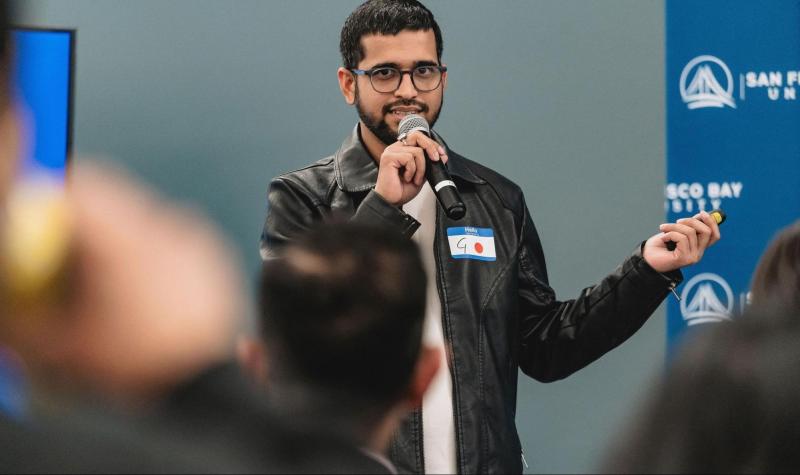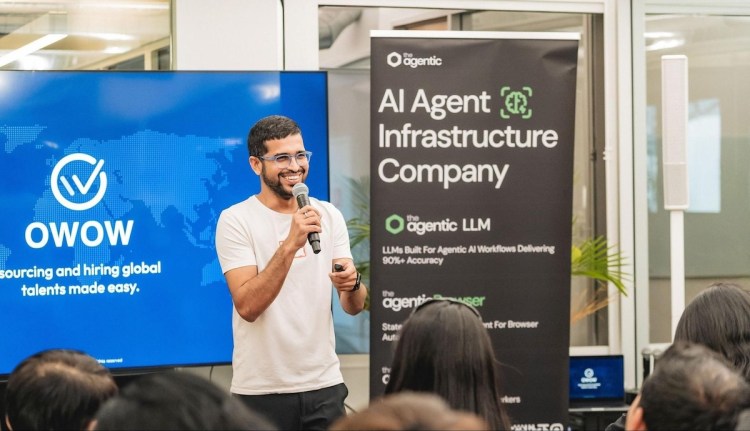Every successful company is built on a foundation of people—the collective talent, passion, and expertise that brings ideas to life. That’s why hiring the right person is not just a tactical need; it’s the lifeblood of progress.
Yet, for all their importance, most hiring processes remain fractured because they are slow, manual, and geographically limited, leaving companies struggling to fill roles fast enough to keep up with their growth. At the same time, many professionals in underserved markets continue to be sidelined—not because they lack skills or potential but because traditional systems fail to see them.
It’s this systematic bottleneck that self-taught entrepreneur Gangesh Pathak set out to address with OWOW. Using large language models (LLMs) and agentic AI, OWOW enables autonomous agents to source, vet, interview, and assess prospective employees, and manage compliance, contracts, and payroll across countries. By automating these processes and providing a unified system, the platform helps reduce time-to-hire and opens up a huge pool of talent that would otherwise be inaccessible.
This article is a deep dive into how Gangesh’s experiences and insights led him to challenge the status quo with OWOW and how it empowers companies to build global teams more efficiently and equitably.
A founder’s journey rooted in grit and vision
Gangesh Pathak’s story begins in Ballia, a small town in India that most maps overlook in the global startup conversation—but he did have access to the internet, which became his teacher, accelerator, and gateway to systems thinking.
During college, Gangesh immersed himself in technology while others prepared for exams, experimenting with growth hacks, cold emails, and landing pages to co-found Saletancy, a sales and marketing firm. It was the epitome of a bootstrapped venture—launched without external funding and relying solely on relentless execution, resourcefulness, and learning valuable lessons from early setbacks.
Saletancy served over 200 clients worldwide, helping both startups and large enterprises build repeatable outbound and go-to-market systems as a trusted lead generation company.
This experience provided Gangesh with real-world insights into the mechanics of business scaling and, more importantly, exposed a critical vulnerability common across companies of all sizes: the hiring process.
He saw over and over again how progress was severely hampered by the inability to hire the right people quickly enough. Geography dictated opportunity and hiring was broken—slow, biased, and deeply rooted in outdated processes. Something had to change.
The systematic gaps that led to OWOW
The conviction that hiring was full of structural deficiencies became even stronger after Gangesh relocated to the United States and joined San Francisco’s tech ecosystem.
While attending founder dinners, tech meetups, and investor gatherings, he noticed others shared the same frustrations he knew so well and even top-tier startups were struggling with hiring, with manual sourcing, long delays, high costs, and border-related friction common across industries.
Gangesh recognized that the need for speed, scale, and objectivity in hiring was incompatible with traditional processes, which couldn’t meet global demand—especially as startups increasingly adopted remote work and sought international talent.
It was around this time that the field of Artificial Intelligence was also undergoing massive development, and Gangesh closely followed the emergence and growing capabilities of LLMs like GPT-3, GPT-4, and Claude. He saw their potential but looked beyond simple automation.
His key insight was that these advanced AI technologies, particularly agentic systems combined with cognitively advanced LLMs, could do more than just assist human recruiters with isolated tasks, they could be applied as a full-service infrastructure capable of significantly streamlining the hiring process.
That’s when the concept clicked: what if the future of hiring is a system where AI agents don’t assist recruiters—they are the recruiters?
Building OWOW: the infrastructure layers for global hiring

That question became OWOW, an AI-native hiring infrastructure built on modular AI agents that handle each stage of the hiring process which Gangesh co-founded with COO Divya Pandey. These agents are engineered with real-time contextual awareness and decision-making capabilities.
Unlike traditional platforms that only match resumes to job listings and rely on human effort to sift through shortlists and coordinate interviews, OWOW’s AI agents execute all core hiring functions.
It sources candidates globally, vets their skills, conducts initial technical interviews, evaluates cultural fit, manages compliance across different countries, and even assists with payroll—all while ensuring humans remain in control of final judgements and uphold fairness.
As CEO and co-founder, Gangesh led OWOW’s product vision, AI strategy, and go-to-market execution, and built the initial prototypes, assembled the team, and worked closely with early users to validate that the product was not only optimal but also inclusive.
OWOW exists to break down the invisible walls that have kept talent in developing regions—such as India, Latin America, Eastern Europe, and parts of Africa—from participating fully in the global job market. By shifting from gatekeeping to enablement, OWOW is reframing what fair, fast, and borderless hiring can look like.
“The first time we had an AI agent run a full tech screening and summarize a candidate’s fit in bullet points — it was eerie. Not because it wasn’t accurate, but because it felt like the future had just arrived quietly,” Gangesh recalls.
Community as strategy: scaling beyond the product
While OWOW’s technology evolved, so did its community. Gangesh knew that establishing a successful company required not just a functional product, but also significant cultural resonance and acceptance.
In just one year, he has created a community connecting 48,000 founders and investors through 62 events, creating hubs for startup networking, cross-border collaboration, and AI exploration.
He has also become a recognized voice in conversations about the future of work and agentic AI, sharing his insights as a speaker at major industry events like the Society for Human Resource Management (SHRM) and serving as a judge at GenAI hackathons and startup competitions, reflecting not only OWOW’s importance but also the extensive scope of his impact on innovation and global workforce transformation.
Vision for the future: from hiring to human potential
Looking ahead, Gangesh Pathak sees OWOW as just the beginning. His ultimate goal is to build foundational infrastructure encompassing subsequent hiring stages such as onboarding, upskilling, and adaptive team building.
He believes that agentic AI will soon become the operating system for HR, with intelligent agents managing everything from recruiting to employee growth in real-time, and he wants OWOW to lead that evolution.
Gangesh intends to contribute through research, publishing insights, and continued advocacy for the construction of next-generation work tools and platforms: “I want to be known not just as a founder but as someone who helped redefine how we think about work, talent, and opportunity in a global, AI-native world.”
VentureBeat newsroom and editorial staff were not involved in the creation of this content.

